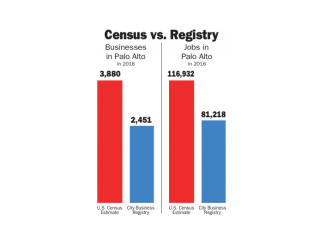
BY ELAINE GOODMAN
Daily Post Correspondent
Palo Alto City Manager Jim Keene has proposed a general fund budget for the next fiscal year of $214 million, a 1.7% increase from the current fiscal year’s budget, and he once again plans to tap into reserve funds to balance the budget.
The city is projecting “continued healthy growth” in major revenue sources including sales tax, property tax, and hotel tax, also known as transient occupancy tax or TOT, compared to levels in the adopted budget for the current fiscal year. The fiscal year 2019 budget assumes increases to major tax revenues of about 4.9%, or $5.8 million.
And the budget proposes the elimination of 6.6 full-time city positions, which would be on top of a previously approved reduction of 11 positions in the fire department due to Stanford University’s decision to reduce payments to the city for firefighting and paramedic services.
Even so, expenses in the proposed general fund budget outpace revenues by $276,000, a gap that would be filled using funds from the city’s budget stabilization reserve.
The City Council Finance Committee will review the budget on May 15, 16 and 23. The council is scheduled to adopt the budget on June 18.
Fiscal year 2019 will begin on July 1.
During a council preview of the proposed budget on April 30, councilman Greg Tanaka questioned why funds from the budget stabilization reserve, or BSR, were needed to balance the budget.
“We’re in a booming economy. We have record unemployment, we have a record stock market.
“In this year, if we can’t balance the budget without dipping into the BSR … what do you think is the driver of that?” he asked Keene. “You would think that we would have a surplus in a booming economy year.”
Keene said the reserve funds would be used to cover one-time expenses, such as the November election. The amount remaining in the BSR would be about 19% of general fund expenditures, above the 18.5% target level set by council policy, he said.
Keene said the Finance Committee, of which Tanaka is a member, is welcome to come up with ideas to balance the general fund budget without using reserve funds.
The budget approved for the current fiscal year used $3.4 million from the budget stabilization reserve to help cover general fund expenses, including $1.7 million for the track watch program; $2.3 million in electricity costs for streetlights and traffic signals, which were shifted to the general fund; and the expected $2 million impact of negotiations with Stanford over fire services.
Rising pension costs
In a letter accompanying the fiscal year 2019 proposed budget, Keene noted that employee pension costs are an ongoing challenge for the city. According to figures from the California Public Employees Retirement System, or CalPERS, Palo Alto faced a $405 million shortfall for employee pensions as of June 2016.
In addition, CalPERS is reducing the rate of return it expects to receive on its investments, also known as the discount rate, from 7.5% to 7.0% over three years, starting with 7.375% next fiscal year. With less investment revenue coming in, Palo Alto and other cities in the CalPERS system will have to start paying more to the retirement fund.
Palo Alto’s fiscal year 2019 budget includes the transfer of $2 million to a trust fund set up by the city to cover pension costs, which would bring the fund’s total to $7.6 million.
A CalPERS consultant previously recommended that the discount rate be reduced even further, to 6.2% — something that Vice Mayor Eric Filseth pointed out during the April 30 meeting. Filseth has said that he believes 6.2% is an accurate projection.
“At 6.2% ROI (return on investment), which is the realistic ROI for CalPERS … our actual general fund pension costs this year are $8 million higher than this budget says they are,” Filseth said last month. “This budget runs an $8 million operating loss in the general fund in 2019. What we do with that piece of information during the budget hearings is up to us.”
The general fund covers much of the city’s day-to-day operations aside from those covered by special funds, such as utilities and the airport.
Higher utility bills
Within the city’s utility funds, the budget would raise rates for utilities including electric, gas, water and sewer. The proposal is expected to increase the median monthly residential utility bill by 4.7%, or $13.40, to $295.88.
Sewer rates would increase the most, by 11%. The second largest increase would be for electric, at 8%, to fund “rising transmission costs, new renewable projects coming online, and substantial capital investment and replacement in the electric distribution system,” the budget proposal says.
The proposed 4% increase in water and gas rates is to cover increased costs for gas and water main replacements and for seismic improvements to water reservoirs. A 2.9% increase is proposed for fiber optic and stormwater fees, based on changes in the Consumer Price Index. No change has been proposed for trash rates.
The proposed rate changes are still under review.




How do you eliminate “6.6 full-time city positions”?
So why did we just give our water away free to EPA while mountain view gets $5M for theirs?
So this is the way he gets around the polls showing we don’t want a tax increase and that show a 20% decline in confidence? Maybe if he hadn’t wasted tens of millions of dollars on unwanted and dangerous road furniture and other “traffic-calming obstacles” the city’s ratings would be higher. How about using this latest outrageous increase to REMOVE those hated dangerous obstacles that are actually increasing car traffic as we have to go miles out of our way to get where we’re going?
Instead of taking money out of reserves, the city manager should cut back in personnel costs. 6.6 FTE hardly seems like enough of a reduction. How about replacing expensive city workers with more contractors (who don’t get pensions or lifetime free healthcare). What about putting city projects on hold and laying off those employees? Nobody thinks these roundabouts and street narrowing projects is a good idea. How about laying off those people. I’m sure they can get jobs in another city. Bottom line, the manager needs to cut more and borrow less from reserves. Prediction—-Tanaka will push for more cuts while Filseth will want to spend and put it on the proverbial city credit card.
If the city didn’t have the utilities as a cash cow, they’d have to live within their means. I resent having my utility bill increase all the time just to pay these outrageous pensions. The city needs to make cuts, understanding that we can’t afford this bureaucracy. I’m voting against the big spenders, tax raisers and those who raise utility bills.